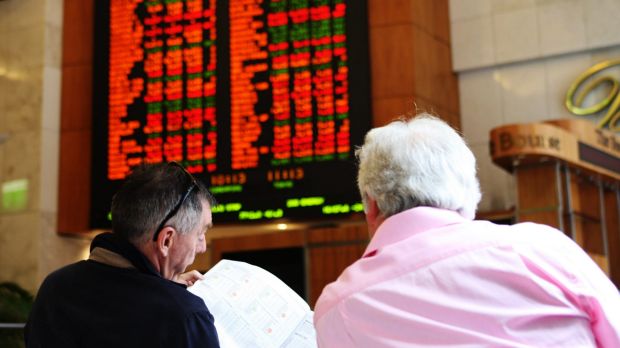International diplomatic tensions dominated the second week of US president Donald Trump's tenure, spooking investors and forcing most bourses lower, while earnings downgrades plagued the local market.
The S&P;/ASX 200 index experienced the largest single-week fall since November, with broad losses across every sector except utilities leading the market to finish at 5621.6 on Friday, down 1.6 per cent on last weeks' close. The broader All Ordinaries was down by a similar proportion over the five trading days. On Friday, the ASX reversed early gains to finish down 0.4 per cent.

It was a similar picture globally. The US benchmark S&P; 500 and the British FTSE 100 indices shed 0.6 per cent in the week to Thursday.
"Trump jitters dominated markets over the last week with his 90-day travel ban and reports of belligerent phone conversations with various country leaders (including Australia's) and attacks on allies like Germany adding to concerns about inexperience and political and trade risk," said AMP's head of investment strategy and chief economist Shane Oliver. "So despite pretty good global economic and profit news, this saw most share markets dip and bond yields fall."
The Aussie dollar broke through the US76c resistance level on Thursday, shortly after Mr Trump lauded the benefits of currency devaluation and a key administration adviser accused Germany of manipulating the value of the Euro. It traded above US76¢ all of Friday after threatening to breach US77¢ the previous night.
"A still gradual Fed also weighed on the $US which combined with news of a record trade surplus saw the Australian dollar rise," Mr Oliver said.
The market on Friday was led lower by the big miners as Chinese traders returned from New Year holidays and dumped commodity futures. Rio Tinto lost 4 per cent over the session, while BHP shed 3.1 per cent. The big miners dropped 4.9 and 4.8 for the week respectively. Fellow miner Fortescue was down 4.6 per cent for the day and 2.7 per cent for the week
The big four banks all finished lower for the week, while the sector as a whole shed 1.5 per cent.
Aconex was Friday's biggest gainer, up 5.5 per cent, but the week's biggest loser. It finished down 45.5 per cent from where it closed last Friday - despite small gains since then, it didn't materially recover from Monday's profit downgrade.
On the other side of the ledger, the week's largest gainer was gold miner Resolute Mining, up 12.3 per cent over the five seasons, with fellow miner St Barbara also rising strongly, up 7.3 per cent. Organic baby formula exporter Bellamy's gained 8.9 per cent amidst a battle over its board, while rival A2 Milk also finished up 6.6 per cent for the week. Downer EDI also rose strongly on Wednesday's profit guidance upgrade - up 6.2 for the week.
Stock Watch: AusCann
Shares in newest cannabis stock to list on the stock exchange, Auscann Group Holdings, plummeted 8.3 per cent to 22c. Investors seemed unimpressed by the company's successful reverse takeover of TW Holdings. The company hopes to develop products targeting palliative care symptoms, chemotherapy-induced nausea, treatment-resistant childhood epilepsy, and chronic pain. Auscann's largest shareholder is North American producer Canopy Growth Corp which provides the company access to its intellectual property in the cultivation, manufacture and supply of cannabis products.
US dollar
The US dollar, which began climbing after Trump's election victory in November on expectations that his stimulus policies would stoke growth and inflation, has hit turbulence since the new president has been putting more emphasis on trade protectionism and limiting immigration. On Thursday night the US dollar index - which measures the greenback against a basket of currencies - fell to 99.23, its lowest since mid-November. At the same time, the Aussie hit a two-month high of US76.96¢.
Other central banks
Three major central banks met this week. The US Federal Reserve kept interest rates on hold and investors weren't given much of a clue as to when the bank will start lifting its three promised hikes. The Bank of Japan also kept rates on hold and maintained it will keep buying Japanese government bonds to keep the 10-year yield steady at around zero per cent. The Bank of England also kept its cash rate steady, though it sharply upgraded the United Kingdom's growth forecast.
Service sector
Service sector activity has kicked off the year solidly with lifts in sales, employment and new orders. The Australian Industry Group's Performance of Services Index (PSI) dropped 3.2 points to a level of 54.5 points in January, but remained above the 50-point level signifying expansion. Ai Group said four of the five activity sub-indexes expanded in January, with supplier deliveries rising to 61 points - its highest ever level. Sales and new orders also expanded, but at a slower rate, while stocks declined into contraction.
China Central Bank
China's central bank has surprised financial markets by raising short-term interest rates on the first day back from a long holiday, in a further sign that it is slowly moving to a tighter policy bias as the economy shows signs of steadying. The People's Bank of China said it raised the interest rate on open market operation reverse repurchase agreements (repos) by 10 basis points. Two banking sources also told Reuters it had raised the lending rates on its standing lending facility (SLF) short-term loans.